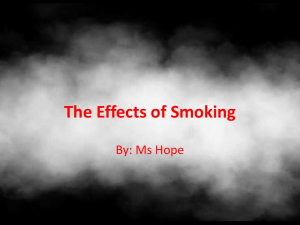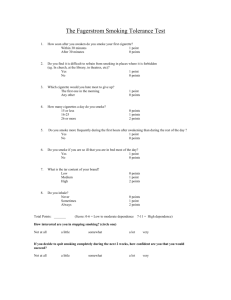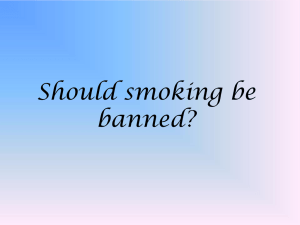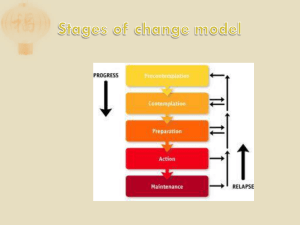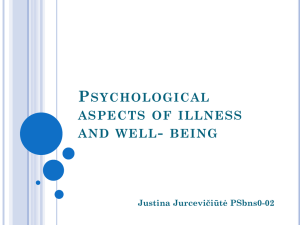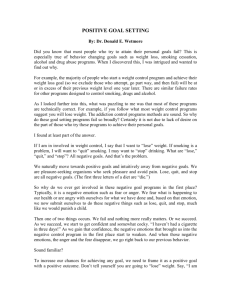A Student Essay on Effects
advertisement
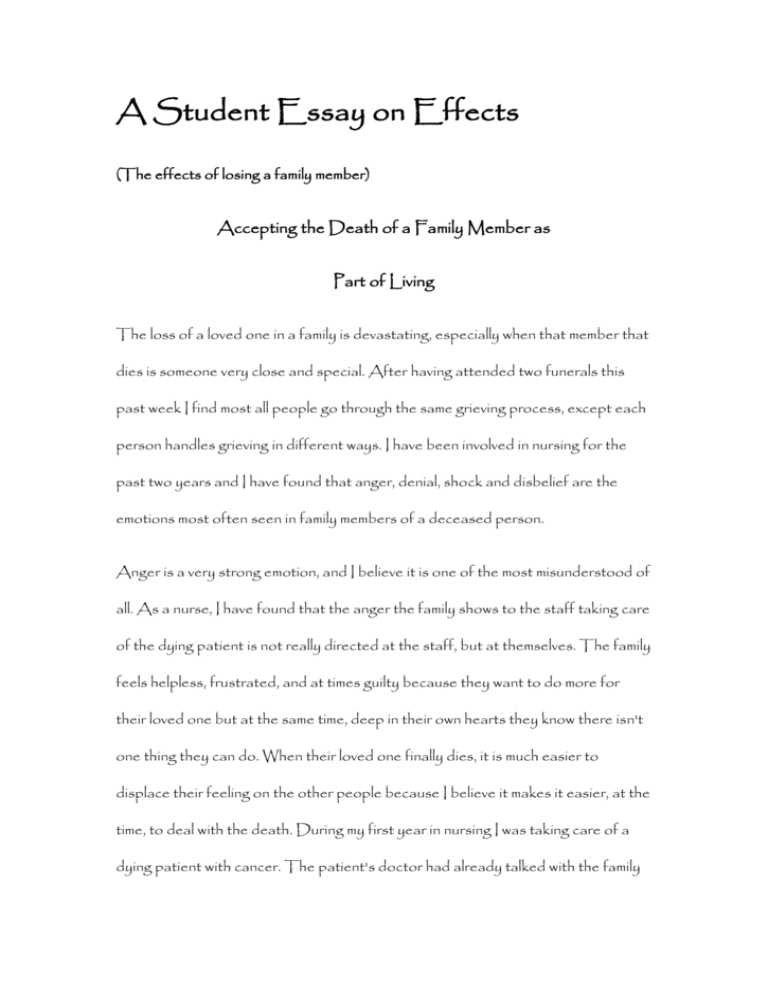
A Student Essay on Effects (The effects of losing a family member) Accepting the Death of a Family Member as Part of Living The loss of a loved one in a family is devastating, especially when that member that dies is someone very close and special. After having attended two funerals this past week I find most all people go through the same grieving process, except each person handles grieving in different ways. I have been involved in nursing for the past two years and I have found that anger, denial, shock and disbelief are the emotions most often seen in family members of a deceased person. Anger is a very strong emotion, and I believe it is one of the most misunderstood of all. As a nurse, I have found that the anger the family shows to the staff taking care of the dying patient is not really directed at the staff, but at themselves. The family feels helpless, frustrated, and at times guilty because they want to do more for their loved one but at the same time, deep in their own hearts they know there isn't one thing they can do. When their loved one finally dies, it is much easier to displace their feeling on the other people because I believe it makes it easier, at the time, to deal with the death. During my first year in nursing I was taking care of a dying patient with cancer. The patient's doctor had already talked with the family and informed them that the patient had about a couple days left to live. Needless to say, this patient died that same day while I was taking care of him. Being in nursing, I always knew I would have patients die while I was taking care of them. I had analyzed my own feelings about death so when the time came I would be able to deal with the situation. Well, it didn't turn out at all the way I had expected. An older brother of the deceased descended on me with fire and brimstone, accusing me of being the blame for his brother's death because, after all, I was only a student nurse and how dare the hospital place a student nurse to take care of someone as critical as his brother. I took all of his insults, shouting and yelling, and even throwing things at me. My instructor immediately came to my rescue to take me away, but I told her I wanted to handle it my own way if I was ever to become a good nurse. After some time was given the whole family to spend privately with their deceased one, I went over to this elderly gentleman, whom I knew was grief stricken, and I placed my hand on his shoulder and told him I understood exactly how he felt because I too had lost close family members before and that what he had said previously to me was alright. When I said this I was as honest as I had ever been in my life. The older gentleman looked up at me and for a moment I thought he was going to hit me, but, lo and behold, he put his arms around me and hugged me ever so tightly and began to cry inconsolably. After he had had a good cry he was very apologetic and remorseful for having treated me the way he had. He was, in fact, very thankful to me for making his brother's last hours as comfortable as I could. Weeks later, my instructor called me in her office and gave me a card the family of this patient had sent to me. In the card were thank yous from all family members and in one corner of the card was a note from the older gentleman. It said, "To dimples. Thank you so much for your support during my grief and most of all thank you for allowing me to express my grief in the only way I knew how and for letting me know it was O.K. I'll never forget you." When I read this I was in tears because I felt so good that I had been capable of helping a fellow human being. What I learned from all this experience is that if anger is expressed at one in a time of grief it is not really intended at us but at the situation. Denial is perhaps more difficult to handle than anger. When a person denies the death of a loved one it isn't easy to reach that person to have a therapeutic communication, because he seems to close off his mind to everything. I know this from personal experience because I lost my mother and father at an early age, and it took me forever to finally accept their deaths as final, especially my father's because he died so suddenly from a heart attack and his death was so unexpected. When I was told of his death, at first I laughed and thought they were playing a joke on me. Everything that happened from the time of his death to the funeral was like a dream to me. Even when I saw my father in his coffin and when I saw him being lowered into the ground I still believed my daddy was somewhere else. I experienced denial for months when I would think to myself that if I had the money I could go around the world and that I would indeed find him somewhere on earth; all I had to do was look hard enough. Also, when I would come home and visit my mother, the first thing I would do was go through all the house looking for him. It took me months and months to finally accept my father's death. When I finally accepted it as final, I was able to let go. Denial to me was the only way I was able to deal with my father's death. At times I think we use denial as a defense mechanism in order to protect our sanity. Shock and disbelief are very common in all people when they lose a close family member. Even when the family knows their loved one is going to die for months prior to the death, when he does die they still experience shock and disbelief at his passing away. A friend of mine had a parent with a terminal illness and my friend knew he was going to die, but when he did she was in such shock and disbelief. I asked her why, when she had known for months that he was going to die, and she told me that she never really believed it. Now that it had actually happened, she felt sad because she thought it would never really happen. No matter how one thinks he is prepared for a death of a family member, we never really are because we think death always happens in other families and not in ours. Death of a close family member affects people in different ways. I believe everyone should know what these ways are so we can intervene and help family members deal with their grief. It seems like in today's society death is a subject no one should talk about, but in fact, it is one that should be talked about because if one cannot accept death, how can one accept life? Everyone should come to terms with his feelings on death because all people, at lease once in their lifetimes, have to go through the death of a loved one; it's part of life. A Student Essay on Causes (The causes of a failure to quit smoking) A Smoker's Nightmare Being a cigarette smoker for 13 plus years, I have found myself asking, "Why can't I stop smoking?" Last Thursday I participated in the Great American Smokeout, and for two days I didn't have a cigarette. I really tried to stop smoking, but by Saturday afternoon I just couldn't stand it anymore. I broke down and smoked one after supper. I learned there were four major reasons why I couldn't stop smoking: my dependence on it, the fear of gaining weight, very little support, and pressures from school and family. The chemical dependence is the main factor that kept me from stopping. The nicotine in all tobacco products is the drug that affects the central nervous system and creates a psychological dependence on smoking. While most psychologists believe that smoking is more a psychological than physical problem, I don't agree. The withdrawal symptoms I experienced during the two days without smoking were numerous. I felt dizzy, weak, and nauseous. I also had a horrible cough, increased appetite, and sleepless nights, to say nothing about the cigarette cravings I experienced. While some of these symptoms may be attributed to psychological problems, you have to agree that some don't. For example, I can't make myself feel weak, dizzy, and nauseous even if I tried real hard. So where do the psychologists get off telling me that my mind is faking all this? Also, I know all the health risks I'm taking every time I puff on a cigarette and I've seen all the gory pictures of lungs eaten up with lung cancer. So if it were purely psychological, this alone would be enough to scare me into quitting. There are alcohol clinics, drug rehabilitation centers, and numerous other clinics to help people "kick their habits." So why don't people have a smokers hideaway? Smokers need a place to go, for at least a week, so they can get the professional help they need. Believe me, if someone opened a smokers' hideaway here, I'd be the first to sign up. The chemical dependency is just too hard to bear alone. Fear of gaining weight is another factor, and ties in with the chemical dependence, in a way. It's a proven fact that smoking cigarettes diminishes appetite. Although this is more a psychological problem, it's still scary. While on my two day, smokefree excursion I experienced a high increase of appetite. I was eating constantly and couldn't stop myself. I know it had a lot to do with keeping my mind off smoking; and keeping my hands busy, but I realized if I kept eating like that I'd gain a lot of weight, fast. Obesity has never been a problem for me; in fact, I always had trouble maintaining weight. After giving birth to three children, I gained some weight, but not enough to be obese. My husband has gained very little weight in the five years we've been together, and is still as gorgeous as he was the first day I met him. Now what do you think would happen if I suddenly became overweight? Now I have to ask myself another very important question. Would I rather die of lung cancer from smoking or experience heart problems from being overweight? This choice is a very hard one to make because both of them are equally dangerous. While most people might laugh at my fear of gaining weight, to me and many others the fear is no laughing matter. Peer support in another factor in "kicking the habit," and like the fear of gaining weight, it is more a psychological problem. The support I received during my two days without smoking was almost non-existent. While at school, my advisor, Mr. Paul Roberts, and a few other students gave me a lot of confidence and encouragement needed to get me through the crucial first day, and some of the second day. However, they couldn't go home with me. My husband Kelly is a very heavy smoker and lacked the confidence in my ability to stop. Instead of saying something like, "I know you can do it because I have faith in you," he kept saying things like, "Why even try? You know you can't do it!" At first it made me so angry that I was determined to prove him wrong. When I finally grabbed that first cigarette, I was really disappointed in myself and my husband for not trying to help me. I was hurt, angry, and very disgusted. So smokers who want to quit make real sure that the people whom they spend the most time with are for them, not against them; otherwise, they'll never be able to quit! School and family pressures play an important role in stopping, and can be more severe than lack of support. Right now I'm experiencing trouble with this class and my advertising class. I'm here on the 40th anniversary scholarship and know if I don't pass all my classes with a C average I'll lose the scholarship, thus not being able to return to college in the spring. Add that sort of pressure to the pressures I have at home and you have someone waiting to explode like a time-bomb. I'm a fulltime student, a mother of three small children, ages 7, 3, and 14 months, a wife with a house to take care of, and a dog, too. Where do I find time to take care of everything? At night when all are sleeping. When I quit smoking those two days I was worse than a grouch. I turned into a monster. I yelled at the kids, slapped my husband, kicked the dog just. to name a few. So what do you think my husband's reaction was? Why, he threw cigarettes at me and begged me to smoke them. There are pressures everyday, some more serious than others, but add normal pressures to something big like trying to stop smoking, and we have a major disaster. The pressures are just another example why smokers need a special hideaway of their very own. Cigarette smoking is very dangerous. Smoking causes cancer of the mouth, larynx (voice box), pharynx, esophagus, urinary bladder, and lungs. Smoking also causes coronary heart disease and Buerger's disease (in which the arteries of the legs thickened and became obstructed, leading to gangrene affecting the feet and toes.) Non-smokers can also get lung cancer from sitting or working in smoke-filled rooms. Even though smokers know all this, they continue to endanger the lives around them, as well as their own, but as I have experienced it's not because we want to, it's because we can't stop ourselves. Cigarette smoking is a drug and should be treated like one. People are out here screaming for HELP! So join forces you nonsmokers' and help us handicapped people to "kick the habit" once and for all!

